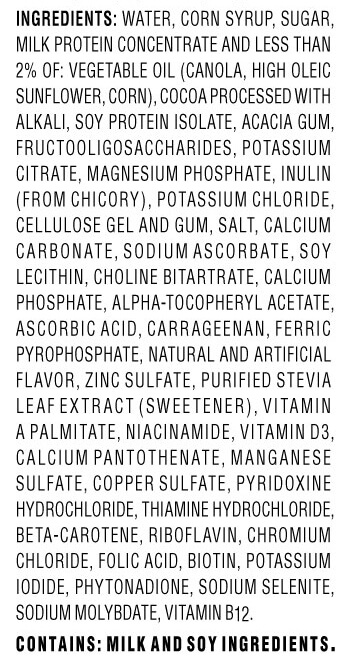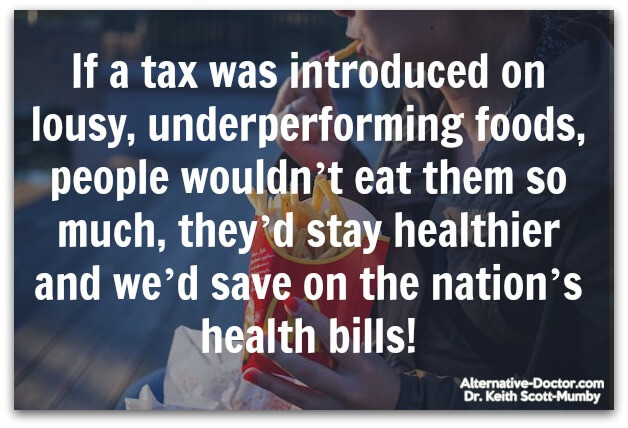Now this I like! A tax on junk food!
I don’t know how it works in the rest of the world but here in the USA, if you want to get rich, you figure out a crappy cheap product, and sell it for the most you can get, by massive advertising, which tells blatant lies about it’s value and health worth.
You don’t worry about science, you just lie! Untruths work just as well as facts in selling products, you find. If people come along with quality science, showing your product is not only unhealthy but it hurts or kills people, you go into overdrive attacking them. Instead of wasting all that money on advertising, you spend untold $millions on vicious lies to discredit those who claim you are hurting people.
You do not, of course, modify your product in any way, or try to make it better. That would be admitting that there was a problem with your product. That could cost you sales.
No… better to keep up the storm of lies. The profits keep coming because—face it—people around here don’t bother with facts. To them, advertising gives us the “facts”.
It’s very depressing, I can tell you.
Take the television advertising storm selling the drink Boost from Nestlé. “Contains 25 vitamins and minerals,” it boasts.
What?
It has 25% or less of the so-called dietary requirement. That’s about 100 times too little for any nutritional value.
Calcium, for example, for “strong bones” is only 30% of the recommended allowance.
No mention of the 240 calories, which is way more than a can of disgusting sugary Coca Cola (140 calories). Boost is sweetened with high fructose corn syrup. Nobody is that stupid about it’s health damaging properties.
They claim on their website it is “complete” nutrition. That’s a lie. You would quickly die, drinking just this stuff, trust me!
At $9 it is grossly overpriced. I guess it costs around 15 cents to produce (if that).
But Nestlé is very rich and spends $millions peddling this junk as a supposed healthy drink.
Here’s a list of the ingredients:

Notice that B vitamins, chromium, selenium and molybdenum—all life essential nutrients—are last on the list, meaning the least amounts.
Well, This Could All Change If…
A tax was introduced on lousy, underperforming foodstuffs that actually caused health problems, such as sugar or corn syrup, as in Boost.
People wouldn’t eat them so much, they’d stay healthier and we’d save on the nation’s health bills! The savings could be in the billions of dollars per annum it’s been calculated.
You could make this even better by using the money raised by those taxes to subsidize fruits and vegetables. That would reduce the cost of these fine foods and people would eat more of them! A double benefit.
Brilliant!
To drive home the point, Linda J Cobiac, PhD, School of Population and Global Health, University of Melbourne, Australia, and colleagues calculated in a population-based model that approaching half a million life-years and over A$4 billion (US$3.08 billion) could be saved with a combination of sugar, salt, and fat taxes, alongside a fruit and vegetable subsidy.
The research was published online February 14 in PLOS Medicine.
“This study adds to the growing evidence of large health benefits and cost-effectiveness of using taxes and regulatory measures to influence the consumption of healthy foods,” the research team writes.
They were making proposals for Australia but I see nothing in the published study that would not apply in full to any and all Western nations.
The findings suggest the potential public-health benefit of individual taxes on sugary drinks, which have either been considered or introduced recently by governments, could be improved by adding levies on other unhealthy foods.
Researchers have calculated that the 10% tax on sugar-sweetened beverages introduced by the Mexican government in 2014 in the face of strong industry opposition could lead to almost 200,000 fewer cases of diabetes and almost 20,000 fewer deaths, as well as cost savings of almost one billion international dollars over 10 years.
The authors of the current study noted in a release: “Several countries have imposed taxes on sugary drinks, with the UK the latest to consider such a policy. Our research suggests that even bigger health gains and cost savings may be possible with food taxes and subsidies on a wider range of foods.”
Seems like the way to go.

The Response
It’s too early to talk about the response of the food industry. But of course they will leap on this and try to discredit it (or ignore it).
Here’s where the problem starts. The Big Food industry spends $billions on political lobbying (another word for bribery and corruption) and they get all the laws passed they need to protect them from meddling scientists, who care about facts over profits—one of the biggest obscenities imaginable in this country!
The USA actually has food libel laws in many states, also known as food disparagement laws or “veggie libel laws”. These provisions make it easier for food producers to sue their critics for libel. Moreover these laws have a deliberately lower standard for civil liability and allow for punitive damages and attorney’s fees for plaintiffs alone, regardless of the case’s outcome.
You may remember that in 1998 Oprah Winfrey, no less, got attacked by Texas beef producers for allowing one of her guests, Howard Lyman, to make disparaging comments about beef in relation to mad cow disease. Beef prices fell from 62 cents to 55 cents per pound.
In a normal U.S. libel suit, the plaintiff must prove that the defendant is deliberately and knowingly spreading false information. The beef producers had to convince the jury that Lyman’s statements on Winfrey’s show were not “based on reasonable and reliable scientific inquiry, facts, or data.”
The jury in the case found that the statements by Winfrey and Lyman did not constitute libel against the cattlemen.2
But not surprisingly Oprah has been reluctant to talk about this episode ever since. Other media people I am sure will take home the lesson that it’s better to keep your mouth shut.
California, I know, has a law making it a felony (a very serious crime) to take or even publish any photograph of the miserable conditions intensive animal feeding lots in which cattle are raised.
David and MacGoliath
A notorious long-running legal case in Britain was an example of the application of food libel laws. McDonald’s Restaurants filed a libel suit against environmental activists Helen Steel and David Morris over a pamphlet critical of the company. The original case lasted ten years, making it the longest-running court action in English history.
Although McDonald’s won two hearings of the case in English court, the drawn-out litigation embarrassed the company so much that McDonald’s announced that it did not plan to collect the £40,000 ($50,000) that it was awarded by the courts.
In any case, the European Court of Human Rights (ECHR) later ruled that the court action violated the universal principle of a fair trial because the defendants had been refused legal aid and had only been represented by volunteer lawyers, lined up against the corporate heavy guns. As a result, the ECHR awarded the defendants a judgment of £57,000 (about $65,000) against the UK government!
On February 15, 2005, the pair’s 20-year battle with McDonald’s came to an end with this judgment. This could not happen after Brexit, I point out!
 Helen Steel and David Morris were sued by the McDonalds Corporation after
Helen Steel and David Morris were sued by the McDonalds Corporation after
they published a leaflet attacking the company for its crappy food
Who dares take on these corporate monsters? In 2011 even Dr. Oz got mauled for letting it be known that fruit juices contain significant amounts of arsenic, remember?3
It’s protectionism of the most monstrous kind.
References:
1. http://journals.plos.org/plosmedicine/articleid=10.1371/journal.pmed.1002232
2. https://en.wikipedia.org/wiki/Food_libel_laws
3. http://www.doctoroz.com/article/dr-oz-investigates-arsenic-apple-juice
